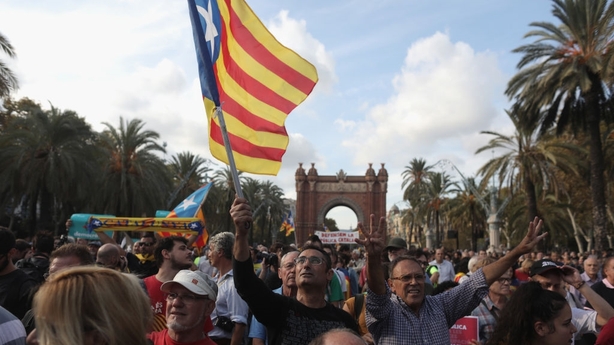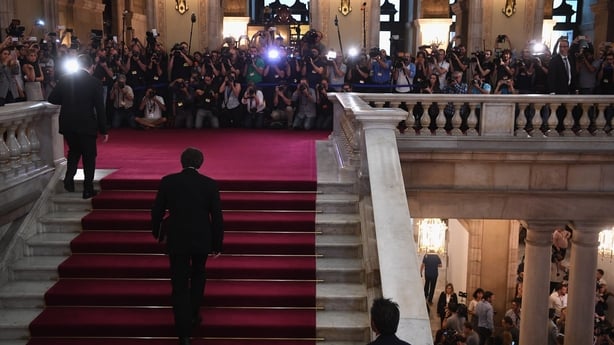Catalan leader Carles Puigdemont and his allies have signed a declaration of independence for the region, which they have suspended pending talks with Madrid, a regional government spokesman has said.
"Catalonia restores today its full sovereignty," says the document, called "declaration of the representatives of Catalonia."
It reads: "We call on all states and international organisations to recognise the Catalan republic as an independent and sovereign state.
"We call on the Catalan government to take all necessary measures to make possible and fully effective this declaration of independence and the measures contained in the transition law that founds the republic."
Spain's Deputy Prime Minister has said an extraordinary cabinet meeting has been called for tomorrow morning to decide what next steps to take, and has has said Mr Puigdemont is not in a position to impose a mediation.
Mr Puigdemont told the assembly earlier that the effects of the declaration would be suspended to allow time for talks to reach a negotiated solution to the standoff over the northeastern region.
"I want to follow the people’s will for Catalonia to become an independent state," Mr Puigdemont said in an address to the Catalan Parliament in Barcelona.
"The 'yes to independence' won. Even though we had to fight against violence. The vote for yes is more than the vote for no."
However, Mr Puigdemont said that his government was willing to delay the process to minimise conflict.
"We propose to suspend the effect of the independence declaration in order to work towards putting into practice the result of the referendum.
"Today, we are making a gesture of responsibility in favour of dialogue.
"We have to follow democracy and peace and respect people who think differently to us.
"I know I have to be responsible and take into account seven million people who are living in Catalonia.
"We will never agree on everything, but we have proved many times that the only way to move forward is with democracy and peace. That requires dialogue.
"The moment is really serious, we have to assume our responsibilities. We don't have to contribute to the violence, it's the opposite."

Switching from speaking Catalan to Spanish, he added: "We are not criminals, we are not mad. We are normal people, and we just want to vote.
"We have been ready to talk and have dialogue. We have nothing against Spain. We want to have a better understanding with Spain. The relationship hasn’t been working for many years, and now it’s unsustainable."
The parliamentary session where Mr Puigdemont made the announcement had been delayed for one hour, reportedly due to last-minute talks with EU Commission President Jean-Claude Juncker over possible "international mediation".
The wealthy, autonomous north-eastern area, with its own language and culture, has long claimed to be distinct from the rest of the country.
Over 90% of voters in a disputed independence referendum held on 1 October showed support for Catalonia breaking away from Spain.
However, turnout was only about 43% (2.3 million people) as Catalans who favour remaining part of Spain mainly boycotted the ballot.
Hundreds of people were injured as national police tried to forcibly disrupt the referendum, which had been ruled illegal by Spain's constitutional court, and there have been subsequent demonstrations in Barcelona both against the police's actions and in favour of Spanish unity.

Earlier today, Spain's government had warned Mr Puigdemont "not to do anything irreversible" and Spanish Prime Minister Mariano Rajoy refused to rule out suspending Catalonia's regional autonomy.
"We call on Puigdemont not to do anything irreversible, not to pursue a path of no return and not to make any unilateral independence declaration, which would lead to illegality," Spanish government spokesman Inigo Mendez de Vigo told reporters.
"I don't rule out anything," Mr Rajoy said in an interview with daily newspaper El Pais when asked about applying the constitutional provision that allows the suspension of autonomy and the imposition of direct rule from Madrid.
"The government will ensure that any declaration of independence will lead to nothing."

